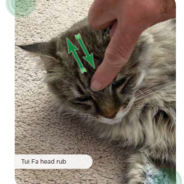How Apps Connect Pet Parents with Vital Pet Care Services
The gig economy has revolutionized pet care, making services like dog walking, pet sitting, and at-home grooming more accessible than ever. Popular apps provide flexible scheduling and income for workers while offering convenient services for pet parents. Let’s explore the pet care services industry, its benefits, and how to ensure quality care and pet safety. Types of Pet Care Services Available Modern pet services are available via mobile apps or websites, and popular ones include: Dog walking and drop-in visits: For pet parents who...
Take the 30-Day Hot Spot Challenge!
Join the 30-day hot spot challenge and get a one-month supply of MIRANEST Jelly Sticks for Dogs and a chance to win an additional three-month supply! MIRANEST Jelly Sticks for Dogs is a miracle solution that can treat hot spots and other skin conditions in as little as 30 days. It harnesses the power of all eight glyconutrients, including sialic acid, to control hot spots and improve skin and coat health while restoring vitality—without the need for steroidal drugs or antibiotics. What’s more, MIRANEST wants you to try Jelly...
Whisker Fatigue: Why Your Cat Needs Space at Mealtime
Animal Wellness is North America’s top natural health and lifestyle magazine for dogs and cats, with a readership of over one million every year. AW features articles by some of the most renowned experts in the pet industry, with topics ranging from diet and health related issues, to articles on training, fitness and emotional well being. Source: Animal Wellness...
Protecting Your Cat: Skin Issues from Chemical Products
Animal Wellness is North America’s top natural health and lifestyle magazine for dogs and cats, with a readership of over one million every year. AW features articles by some of the most renowned experts in the pet industry, with topics ranging from diet and health related issues, to articles on training, fitness and emotional well being. Source: Animal Wellness...
Bond with your cat using Tui na – a 10-minute session
Tui Na, also known as acupressure-massage, is an effective way to connect to your feline friend. Learn how to bond with your cat using Tui na. Cats delight and mystify us. Their furry bodies and wily ways are so appealing, and their expressive meows beckon us to satisfy their needs. As cat guardians, we want to connect with our feline friends. An acupressure-massage technique called Tui na is an effective way to do it. Find out how to bond with your cat using Tui na in a simple ten-minute session. Understanding feline nature ...
How to Handle Litter Box Challenges
Animal Wellness is North America’s top natural health and lifestyle magazine for dogs and cats, with a readership of over one million every year. AW features articles by some of the most renowned experts in the pet industry, with topics ranging from diet and health related issues, to articles on training, fitness and emotional well being. Source: Animal Wellness...
Natural Solutions for Dry Skin in Dogs and Cats
Dry skin can be irritating and painful for companion animals. No matter the cause, one of the best solutions is fish oil with omega-3 and omega-6 fatty acids! Dry skin in dogs and cats is more than just a cosmetic issue—it can lead to discomfort, itching, and even infections. There are many solutions for dry skin in dogs and cats, but dietary supplements rich in omega-3 and omega-6 fatty acids can make a significant difference, regardless of the cause. Learn about effective strategies and products to keep your dog’s or cat’s...
Maintaining a Routine for Your Feline Companion
Animal Wellness is North America’s top natural health and lifestyle magazine for dogs and cats, with a readership of over one million every year. AW features articles by some of the most renowned experts in the pet industry, with topics ranging from diet and health related issues, to articles on training, fitness and emotional well being. Source: Animal Wellness...
Could This Be the Last Skin and Coat Treatment You Ever Buy? Exploring the Pet Health Benefits of Swiftlet Nest
Discover how the pet health benefits of swiftlet nest can transform your pet’s skin, coat, and overall vitality! This natural solution helps treat hot spots, reduce itching, and increase energy in both dogs and cats—without relying on harsh pharmaceuticals. For over a millennium, Asian cultures have recognized the power of swiftlet nest for improving health. Now, this miraculous remedy, packed with glyconutrients like sialic acid, is available to North American pet parents who want a safe, effective way to treat skin issues and...
Boost Pet Vitality with KSM-66 Ashwagandha: A Natural Solution for Dogs and Cats
KSM-66 Ashwagandha boosts pet vitality by reducing stress, increasing energy, supporting cognitive health, and improving overall well-being in dogs and cats. As pet parents, we all want to see our furry companions happy, healthy, and full of energy. Whether it’s a playful puppy bounding through the yard or an older cat lounging in the sun, we want our dogs and cats to thrive at every stage of life. One natural way to boost pet vitality with KSM-66 Ashwagandha is by incorporating this powerful adaptogenic herb into their daily routine....























